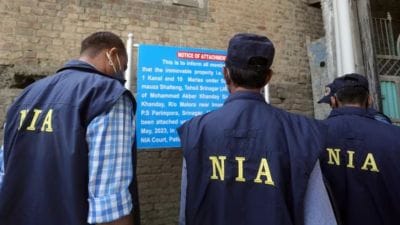Ministry blames DoT for VSNL monopoly
NEW DELHI, APR 20: The Ministry of Information Technology MIT has blamed Department of Telecommunications DoT for not permitting inter...

NEW DELHI, APR 20: The Ministry of Information Technology MIT has blamed Department of Telecommunications DoT for not permitting international connectivity to Internet Service Providers ISPs, leading to continued monopoly of Videsh Sanchar Nigam Ltd VSNL.
In its latest Action Taken Report ATR on the task force, MIT said though private ISPs had been permitted to set up international gateways for internet, the absence of lease circuits had virtually made the recommendation as quot;not implementedquot;.
The ATR said DoT was the concerned ministry for taking necessary action on this task force recommendation. The IT task force had said that VSNL8217;s monopoly be withdrawn quot;on international gateway for internetquot; and that authorised public and government organisations be allowed to provide internet gateway access, including international leased circuits quot;directlyquot; without going to through VSNL gateways.
As per the task force report, private ISPs were allowed to provide such gateways after obtaining security clearances, quot;for which the interface of private ISPs shall only be with DOT, which will set up a mechanism for obtaining security clearance from different security agenciesquot;.
In the ATR, Ministry of Information Technology said that as per the ISP policy, private ISPs were permitted to set up international gateways for internet. quot;The necessary guidelines for setting up of international gateways for internet by ISPs have been issued,quot; MIT siad.
Thus, while international gateways have been set up by private ISPs, connectivity is yet to be permitted. Of the 108 recommendations made by this task force, only 26 have been implemented so far, whereas 27 have been termed as quot;not implementedquot;, according to the latest ATR of the ministry. While 22 recommendations have been termed quot;on goingquot; the remaining three have not been accepted by the ministry.
DOT notice on village phones: The Department of Telecommunications DOT has given a notice of 180 days to private basic telephone operators before taking any action with regard to non-fulfillment of contractual obligations to provide village telephones.
The department is ready to cooperate with the operators, Secretary, DoT, Shyamal Ghosh told reporters adding quot;how the rural villages can be connected should be their approach rather than why this can not be done.quot; Asked whether this could lead to termination of their licences, Ghosh said quot;before that a notice has to be served to the private operators and a notice of 180 days has been given to them.quot;
He, however, said that all private basic operators have agreed in principle to submit roll-out plans for providing telephones in the villages. Addressing a meeting on Rural Telephony organised by the FICCI, Ghosh said the government was committed to connect all villages by the end of 2002.
Department of Telecom Services DTS Secretary P S Saran said that village telephones with long distance facility STD was not a loss making proposition and wireless technologies were appropriate for providing telephones in villages.
Saran said that creation of Universal Service Obligation USO fund would come but the operators should not wait for that to provide telephone facilities in the rural areas. Earlier, Sunil Mittal of Bharti Telecom said that all private operators especially in the metros including basic and cellular should contribute for this National cause of connecting villages.
He, however, said that this problem cannot be solved by taking drastic action by government and called for a collective approach. quot;There is need to sit together and find out ways for solving this problem,quot; he added.
He said wireless in local loop WLL technology was effective for rural areas and asked government to abolish import duty on WLL equipment. Association of Basic Telecom Operators ABTO asked the government to remove all policy barriers and all operators including Internet Service Providers ISPs and other cellular operators should be allowed to participate in providing VPTs.
ABTO also suggested setting up of Rural Telecom Corporation for managing USO fund for this purpose. There are six basic operators in the private sector including Bharti Telecom for Madhya Pradesh, Hughes Ispat in Maharashtra, Tata Telecom in Andhra Pradesh, Reliance Telecom in Gujarat, Shyam Telecom for Rajasthan and Essar Commvision in Punjab.
- 01
- 02
- 03
- 04
- 05































